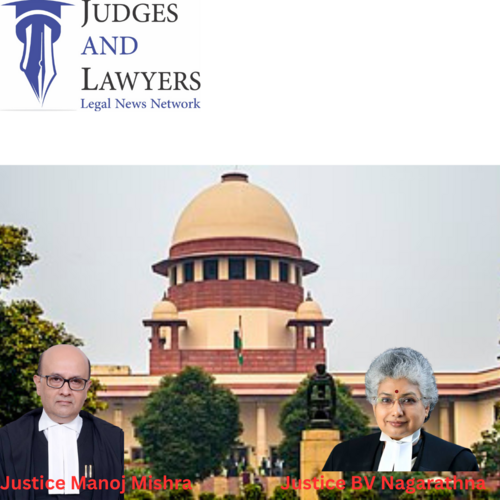
Scope of Judicial Review is very limited in departmental proceedings/enquiry: Supreme Court
- CasesSupreme Court
- June 7, 2023
- No Comment
- 1610
Scope of Judicial Review is very limited in departmental proceedings/enquiry: Supreme Court.
The Hon’ble Division Bench of Supreme Court allowed the appeal filed by IOCL in the light of judgment passed in Deputy General Manager (Appellate Authority) vs. Ajai Kumar Srivastava ((2021) 2 SCC 612) and set aside the order passed by the Patna High Court in Letters Patent Appeal wherein the Hon’ble High Court has proceeded to re-appreciate the entire evidence of disciplinary proceeding as if conviction in a criminal trial was being re-examined by the next higher court.
BRIEF FACTS OF THE CASE
There was tendering process going on in the Corporation for certain jobs. Bids were invited. All the bids were kept in a drawer having its keys with the respondents. It was revealed that certain bids were manipulated and their price have been lowered down to gain benefit. Enquiry was setup. Respondent no. 1 was served with the chargesheet and has been provided with the opportunity of hearing. After following the due procedure, major penalties were imposed withholding 5 increments. The respondent have filed writ petition before Single Judge of Patna High Court which dismissed the petition filed by them and then they preferred Intra court appeal and subsequently appeal was allowed by Division Bench of Patna High Court setting aside the order passed by Hon’ble Single Judge. The corporation has challenged the order passed by the Division Bench of Patna HC before Hon’ble Supreme Court.
CONTENTION OF PETITIONER
The argument raised by the learned counsel for the appellant was that in the matter of judicial review only scope for interference by the High Court in the disciplinary proceedings is to see as to whether the due process was followed during the course of inquiry and fair opportunity was given to the employee concerned. Threadbare evidence could not be examined, that too in an intra-court appeal, when the order of punishment and the appellate order were already upheld by the Single Bench of the High Court.
CONTENTION OF THE STATE
Learned counsel for the respondent submitted that there is no error in the order passed by the Division Bench and this appeal is liable to be dismissed as the respondent have been made scapegoat by other employees.
HON’BLE COURT’s OBSERVATIONS
The Hon’ble Division Bench comprising of Hon’ble Mr. Justice Abhay S Oka and Hon’ble Mr. Justice Rajesh Bindal while examining the scope of judicial review in departmental enquiry/proceeding and setting aside the judgment & order passed Patna HC held that :-
“6. ………………….. The judgment passed by the Division Bench of the High Court shows that matter was dealt with in a manner as if it was the first stage of the case, namely, the inquiry was being conducted and inquiry report was being prepared, which is not the scope in judicial review. The views expressed by this Court on the scope of judicial review in Deputy General Manager (Appellate Authority) vs. Ajai Kumar Srivastava , are extracted below:
“24. It is thus settled that the power of judicial review, of the constitutional courts, is evaluation of the decision-making process and not the merits of the decision itself. It is to ensure fairness in treatment and not to ensure fairness of conclusion. The court/tribunal may interfere in the proceedings held against the delinquent if it is, in any manner, inconsistent with the rules of natural justice or in violation of the statutory rules prescribing the mode of enquiry or where the conclusion or finding reached by the disciplinary authority is based on no evidence. If the conclusion or finding be such as no reasonable person would have ever reached or where the conclusions upon consideration of the evidence reached by the disciplinary authority are perverse or suffer from patent error on the face of record or based on no evidence at all, a writ of certiorari could be issued. To sum up, the scope of judicial review cannot be extended to the examination of correctness or reasonableness of a decision of authority as a matter of fact.
- The constitutional court while exercising its jurisdiction of judicial review under Article 226 or Article 136 of the Constitution would not interfere with the findings of fact arrived at in the departmental enquiry proceedings except in a case of mala fides or perversity i.e. where there is no evidence to support a finding or where a finding is such that no man acting reasonably and with objectivity could have arrived at those findings and so long as there is some evidence to support the conclusion arrived at by the departmental authority, the same has to be sustained .” (Emphasis supplied by the court).
Case Title :- Indian Oil Corporation Ltd. Vs. Ajit Kumar Singh & anr.
Case no. :- Civil Appeal no. 3663 of 2023
Order date :- 17.05.2023


